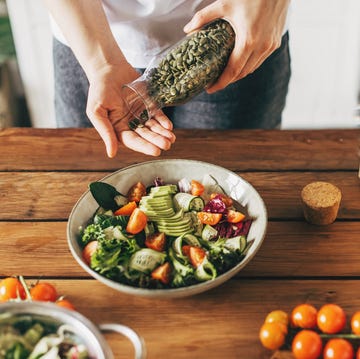7 Healthy Oils to Cook With, According to Nutritionists
Plus, five that you should avoid using with high heat.

We've been independently researching and testing products for over 120 years. If you buy through our links, we may earn a commission. Learn more about our review process.
With so many varieties of cooking oils dominating the grocery store shelves, it can get overwhelming when selecting the right oil for everyday cooking. And the complicated truth is that all cooking oils are not created equal — but understanding the basics will put you ahead of the game so you can create a deliciously perfect meal while still taking care of your body.
Some oils are best suited for sautéing, while other oils may complement certain ingredients and boost flavor. Some oils may even work better when used as a light drizzle or can serve as a base in your favorite dips and dressings. There's no need to bulk up on all the cooking oils at the store, but you might benefit from having more than one or two on hand.
Smoke point or “burning point” is one of the most important factors to consider when choosing an oil to cook with. It is defined as the temperature at which an oil stops glistening and starts to break down, losing its integrity. This is when things start to get smokey. When this happens, the taste can become unpalatable but not only that, it can lose its nutritive value and produce free radicals that are very harmful to the body. When dealing with high heat oils, Good Housekeeping Institute Kitchen Appliances Lab Director Nicole Papantoniou recommends heating your pan first, then adding your oil and then the ingredients to help prevent the oil from getting hot too quickly and potentially burning.
To avoid the smoke, it’s important to choose the right oil suitable for the different types of foods you are cooking. Below, you'll find the best healthy oils to cook with, along with those you should avoid.
Stefani (she/her) is a registered dietitian, a NASM-certified personal trainer and the director of the Good Housekeeping Institute Nutrition and Fitness Lab, where she oversees all nutrition and fitness-related content, testing and evaluation. She holds a master’s degree in clinical nutrition from New York University, as well as advanced certifications as a Women's Fitness Specialist and a Behavior Change Specialist. Stefani is dedicated to providing readers with evidence-based content to encourage informed food choices and healthy living. She is an avid CrossFitter and a passionate home cook who loves spending time with her big fit Greek family.


But Wait, Are Sardines Actually Healthy?

Is Rotisserie Chicken Healthy?

What Happened When I Went 2 Weeks Without Meat

These Vegetables Are Surprisingly High In Vitamin C



















